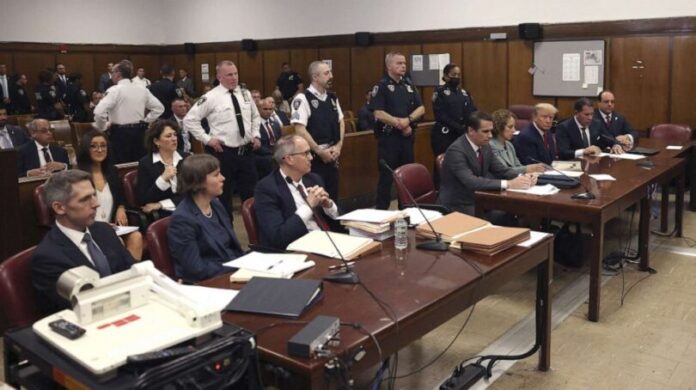
By Stacy M. Brown, NNPA Newswire Senior National Correspondent
Former President Donald Trump is now criminal defendant Donald Trump.
For at least several moments on Tuesday, April 4, Trump was placed under arrest.
His Miranda rights read, and fingerprints taken, but authorities spared him a mugshot and customary perp walk.
Still, as he headed to the 15th floor courtroom at 100 Centre Street downtown, Trump joined the nearly 8,000 other non-violent felony defendants who have been arraigned in Manhattan so far in 2023.
Shortly before 2 p.m. EST, Trump became the first former U.S. President arrested and criminally charged. This after becoming the first to have been impeached twice.
“Can’t believe this is happening,” Trump posted as he headed into a courtroom where he found, perhaps for the first time in his adult life, that he wasn’t in control of the proceedings in front of him.
It’s an ironic, if not predictable, fall for a man who campaigned in 2016 by mercilessly leading chants of “Lock her up,” against Democrat Hillary Clinton.
And as unprecedented and surreal was the arrest, the charges leveled against the bombastic MAGA leader reveal what prosecutors claim is a man who operated as if he were above the law for a long time– including when he ruled the Oval Office.
Indeed, the freshly unsealed indictment brought by Manhattan District Attorney Alvin Bragg included 34 criminal charges – all felonies related to falsifying business records, including several relating to allegedly making hush money payments to porn star Stormy Daniels and former Playboy model Karen McDougal.
Judge Juan Merchan, a former prosecutor with 16 years on the bench, unsealed Indictment No. 71543-23, after Trump’s team reviewed them.
Bragg alleged that Trump falsified business records to hide other crimes, including illegally pumping up his presidential campaign with ill-gotten cash.
Specifically, the indictment alleges that Trump conspired with others to undermine the integrity of the 2016 election, a contest in which Trump defeated Clinton.
Prosecutors alleged that Trump took part in an unlawful “catch and kill” scheme that included an illegal $130,000 payment he ordered to suppress information that would hurt his presidential campaign.
Trump allegedly violated state and local election laws, making the charges a felony.
The charges potentially carry a four-year prison sentence, which could mean that Trump, the current GOP 2024 presidential frontrunner, has entered a race that could end with him either in the White House or in prison.
Despite an apparent somber mood displayed by Trump which signaled just how weighty the proceedings were, his campaign released a fundraising email seeking contributions of at least $47 for a T-shirt that contained a fake mugshot of the ex-president emblazoned with the words “Not Guilty.”
Reportedly, Trump has raised more than $8 million since word of an indictment spread.
With security a big issue in the ex-president’s arraignment, prosecutors in Atlanta and Washington continue to investigate Trump, which could also lead to criminal charges, were provided the ability of witnessing how New York handles a case involving a divisive former commander in chief in a safe and drama-free way could be a critical test case.
The potential cases against Trump in Atlanta and Washington relate to the former president’s interference in the 2020 presidential election in Georgia and the January 6 insurrection on Capitol Hill that left several people dead.
Many top Republicans, including some of Trump’s potential rivals in next year’s GOP presidential primary, have criticized the case against him.
President Joe Biden, who has yet to announce that he’s seeking reelection next year, and other leading Democrats have primarily had little to say about it.
Trump is scheduled to return to Manhattan for a second court date in December.
Prosecutors insist their case against Trump has nothing to do with politics.
“Manhattan is home to the country’s most significant business market,” Bragg stated.
“We cannot allow New York businesses to manipulate their records to cover up criminal conduct. As this office has done time and time again, we today uphold our solemn responsibility to ensure that everyone stands equal before the law.”


